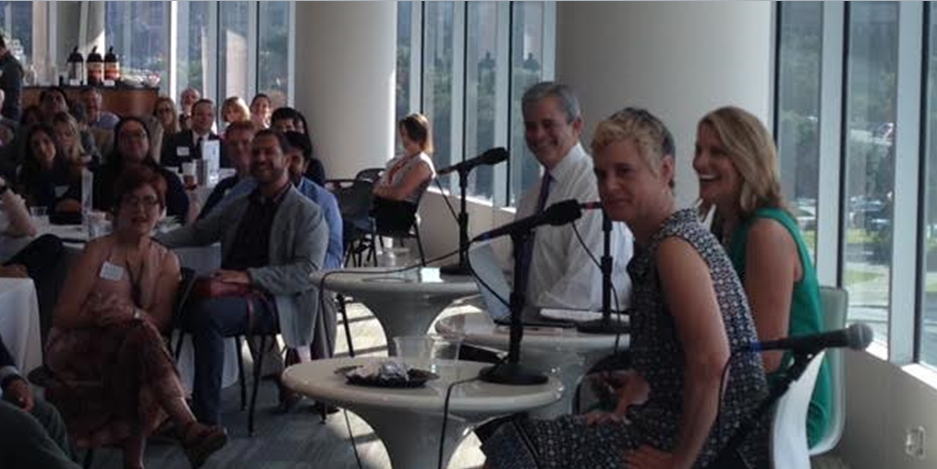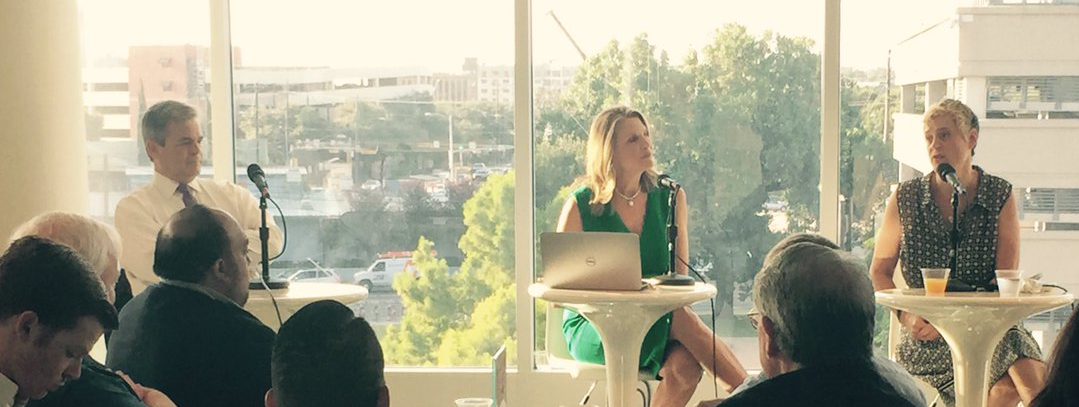
The 2015-16 Engage Breakfast Series closed with Austin Mayor Steve Adler and Travis County Judge Sarah Eckhardt in front of a packed audience at the Long Center.
Last year, these top community leaders shared their thoughts on city and county issues after only a few months in office. This time, they shared their insights and reflections after 18 months on the job. Moderated by Judy Maggio, the discussion was lively and informative.
Some highlights from the morning:
Austin’s greatest quality and where the city falls short
Judge Eckhardt said that resilience has been on her mind lately, and she hopes to increase the value that it holds within a community. “How do we make our entire community more resilient and have a sense of destiny and an ability to chart your own course?” she asked. “How do we build resilience as a community to events that are beyond our control? How are we resilient to droughts followed by floods followed by floods? How do we build resiliency into our planning?”
Eckhardt believes that Austin is significantly falling short in serving the zip codes that don’t include the most engaged voters. “We are falling short serving our communities of color and communities outside the municipalities,” she said. “We are falling short in serving our youth. We are at about 50 percent poverty rate among our 18 and under.”
According to Adler, there is something about the people in Austin and the culture in Austin, that makes it a friendlier place to live compared to other cities around the country and world.
“We used to be known as The Friendly City, before we became the weird city and the live music capital of the world,” he said. “There’s some truth to that, when you talk to people…they say they find more support and more people willing to help and make introductions. There is something that attracts a different kind of person to Austin.”
As for where the city falls short…Even though there is so much wealth and resources and power and potential, the demarcation between the people who live in the city and have access to that wealth is startling. Adler quoted that more than 50 percent of our African American kids 5 years and younger live in poverty. That number is in the mid 40s for kids under 18.
“A city can’t sustain itself at those levels,” he said. “You are wasting too much potential. In a city that has so many things going for it, we ought to be able to do better.”
Biggest obstacles to Austin’s success
Eckhardt believes we are victims of our own success. Everybody wants to live here…but you can’t find an affordable apartment. (“You can’t find an apartment period,” she said.)
“We also live in a state that doesn’t really value the government’s function in leveling the playing field. There are lots of impediments to county and city government in being the leveler of the playing field.”
Eckhardt has been concerned by the nonstop growth mindset of the city. “Everything is so GO GO GO! Everything is grow, get bigger, bring people here…BUILD BUILD BUILD BUILD BUILD. I wonder, when do we honor what we have?” When do we start really loving our city? Not loving the GO GO GO, but loving community and inclusion and resiliency instead of ‘That’s so 10 minutes ago.’”
Adler agreed, but also noted that some of the area’s growth is independent of what the city is doing. “Austin happens to be in the southwest part of the country and all the cities in the southwest are growing at varying degrees.”
“Capitals are growing, and university towns are growing…and capitals that are also university town are growing a lot.”
One of the city’s biggest challenge is the belief that the perfect is the enemy of the good. “This is a city that when confronted with two choices (A and B) will analyze them to death, will conclude that neither is perfect, and we will opt to do nothing,” Adler said. “And ‘nothing’ is an infinitely worse choice than A or B could have been.”
What citizens can do to support affordability
Adler’s suggestions:
- Support local social services organizations. “Before I became mayor I believed that the government was this safety net and these organizations filled in the gaps, and now I know I had that backwards.”
- Support government initiatives that take action. Don’t let the perfect get in the way of the good. Get involved and recognize that the voices that the council hear are always going to be the ones that are most energetic.
Eckhardt’s suggestions:
- Rent out your garage apartment to a single mom or an aging vet.
- Ride transit. Make it as sexy as your SUV.
- Encourage CTRMA to put aside toll revenue for transit in the same corridors they are building out with TxDot.
- When you look at the taxes we pay, instead of looking for every way to get out of them, look at what they actually pay for.
- Sit down with your family and look at what it actually would take to live at the median household income ($55,000) for a family of 4. Walk in the shoes of the average Travis Country resident.
Highs and lows of the last 18 months in office
The 10/1 system has been great for this city, said Adler. “There have been sentiments expressed from both extremes that have never reached the council table before. That has left a much fuller conversation.”
“We’ve done a lot of things in this city to put us in better position to address the affordability and transportation issues,” he said. “We’ve teed up a lot of those issues and now we expect people to actually follow through.”
Adler said his biggest loss came early: “A month into office when I was trying to expand staff and address services…and I did it in a really bad way. Everything about this job is designed to keep your council members reactive and not proactive,” he said. “The hardest part of the job has been creating and forcing the time to be proactive.”
Eckhardt described the most gratifying part of her arrival was hitting the office and seeing the pent up desire for innovation at the county level. She noted that the county oversees 19 separate school districts, 27 municipalities, and territory only half of which is the city of Austin. “We were able to reduce the average tax payer’s bill two budget cycles in a row. And there’s a lot of desire to do collaborative things with the city of Austin.”
Her greatest disappointment? “It was a heartbreak to lose the bond over the courthouse. Because we desperately need additional courts capacity.”
“We have a real need for a robust justice system and yet there was a human cry that we shouldn’t have such a thing downtown…that space should be for condos. That broke my heart.”
Calls to Action
Eckhardt: “What I want to work on is that this community is a community for ALL of us. And that government is the instrument for leveling the playing field, and that we put that central to our lives, not out in the boonies. Because it is OUR government and OUR desire to level the playing field and to reach out to our neighbors…and to share both the burden and the joys of being a Travis County resident.”
Adler: “The greatest and most immediate need is to express your views on the transportation bond in front of city council right now. Because either there’s going to be a consensus to move forward on this tomorrow or it’s something we’ll put off for a year and I’ll spend the year going around the community trying to build that consensus, because I think it’s that important. The election we would like to have this come up in is this November, when we have 300,000 people voting. I would urge people to weigh in on this transportation bond right now.”

